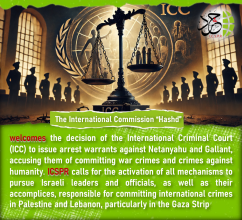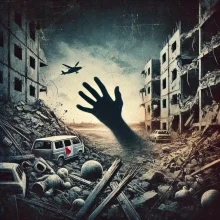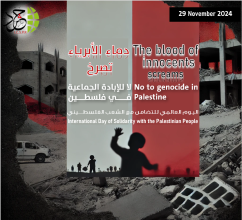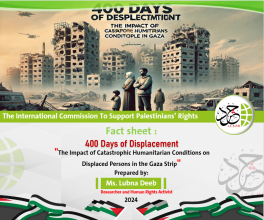
The International Commission Hashd Participates in Establishing the First Global Tribunal of Conscience for Palestine to Defend Palestinian Rights and Translate Them into Legal and Judicial Actions before International Courts and Diplomatic Institutions
Date:11 Jun 2024
Press Release
The International Commission (Hashd) Participates in Establishing the First Global Tribunal of Conscience for Palestine to Defend Palestinian Rights and Translate Them into Legal and Judicial Actions before International Courts and Diplomatic Institutions
Dr. Salah AbdAl-Ati, Chairman of the International Commission to Support Palestinian Rights (Hashd), participated in the international conference for establishing a global tribunal for Palestine, held over three days in Geneva, Switzerland.
The Tribunal of Conscience for Palestine, announced in Geneva, is the first international tribunal of its kind since the Russell Tribunal in 1966. Established by British aristocrat and philosopher Sir Bertrand Russell, the original tribunal aimed to inform and mobilize public opinion against American intervention in the Vietnam War. The Russell Tribunal reconvened later to address human rights violations in Argentina, Brazil, and Chile.
In his speech, AbdAl-Ati emphasized the need to intensify legal and judicial efforts to prosecute occupation leaders before international courts, particularly the International Criminal Court and the International Court of Justice. He also called for the expulsion of the occupying state from international institutions, urging all lawyers and international human rights organizations to leverage universal jurisdiction and ensure war crimes do not go unpunished due to statutes of limitations. He advocated for legislative changes to bring these criminals to justice.
AbdAl-Ati rejected the equal treatment of victims and perpetrators in international courts, considering it disgraceful and incompatible with international laws that grant occupied peoples the right to resist occupation by all means.
He also called on Switzerland, the host country of the tribunal and home to major international human rights institutions, to convene an international meeting to discuss Israel’s violations of the Fourth Geneva Convention. He praised international efforts to boycott the occupation and the institutions supporting it.
In his address, AbdAl-Ati urged the formation of an international humanitarian coalition to enforce the measures of the International Court of Justice and relevant United Nations resolutions on the Palestinian issue. He stressed the need for a global tribunal to hold the Israeli occupation and its leaders accountable for war crimes and genocide.
AbdAl-Ati encouraged human rights activists, lawyers, and the international solidarity movement to rise to the level of the tens of thousands of civilian victims who have been killed, injured, or displaced in what he described as “genocide” perpetrated by Israeli officials with full support from the United States. This support includes providing weapons, military equipment, funds, and political cover for the killing, destruction of homes, and displacement of an entire people, under a guise of lies that justify lawlessness and violations of international laws. He condemned the targeting and persecution of UN agencies and international justice institutions, advocating for sanctions and boycotts against countries and populations supporting these crimes.
Human rights activist Dr. Haitham Manna, President of the Scandinavian Institute for Human Rights, highlighted the importance of the tribunal’s sessions in supporting Palestinian rights. He noted that many participants, including experts and activists representing various institutions, have gathered evidence to present to the International Court of Justice and the International Criminal Court. He stressed the significance of overcoming the obstacles that have allowed the Israeli apartheid regime to evade responsibility and accountability.
Manna called for forming an international regional humanitarian coalition to pressure Israel to stop its genocidal crimes against Palestinians and ensure the flow of humanitarian aid, demanding an end to the use of starvation as a weapon against Palestinians. He urged world countries to boycott and impose sanctions on Israel, working towards its expulsion from international organizations, especially the United Nations. “Those who tear up the UN Charter in its halls should be expelled,” he stated.
Richard Falk, former UN Special Rapporteur on human rights in the occupied Palestinian territories, participated in the tribunal and provided testimony on the occupation’s crimes and the legal pathways to hold not only the occupation accountable but also the international parties that have supported it in its genocidal war in Gaza.
Adel Al-Hamidi presented a paper on the role of media in exposing and documenting the occupation’s crimes in Gaza, highlighting that such documentation serves not only historical purposes but also as written and visual evidence to pursue accountability for the occupation.
Al-Hamidi emphasized the significant sacrifices made by Palestinian journalists and international justice advocates in the media, working to expose the occupation’s crimes and document them, thereby altering the global balance in favor of Palestine. He called for a more balanced presentation of the Palestinian narrative, which the occupation and its supporters seek to erase.
The tribunal, chaired by human rights activist Rashad Tetouan and Tunisian lawyer Najat Hadresh, featured participation from international law professors and human rights activists from occupied Jerusalem, Ramallah, Beirut, Cairo, and Gaza, as well as international lawyers and judges who attended the tribunal in Geneva.
Anwar Al-Gharbi, Director of the Geneva Center for Democracy and Human Rights, stated that the Global Tribunal for Palestine is a legal and judicial platform aimed at translating the growing international solidarity with Palestine into legal and judicial action. This action not only seeks justice for victims but also aims to achieve the ultimate goal of realizing the Palestinian dream of self-determination.
“We view the decisions of the International Court of Justice and the International Criminal Court positively,” Al-Gharbi said, “but we reject the equal treatment of victims and perpetrators regarding the genocide perpetrated by the occupation against the Palestinian people. Such treatment is unacceptable, as all international laws grant the right to self-defense against occupation.”
The tribunal was organized at the John Knox Center in Geneva, previously chosen by Nelson Mandela, South Africa’s leader, to speak after the end of apartheid in his country. The event was initiated by five Geneva-based non-governmental human rights organizations: the Scandinavian Institute for Human Rights, the International Jurists Union – Geneva, the Geneva Center for Democracy and Human Rights, One Justice, and the International Institute for Peace, Justice, and Human Rights, with support from the International Commission (Hashd), the Global Legal Coalition for Palestine, and dozens of international human rights organizations.
The tribunal concluded its three-day sessions with testimonies from international judges, lawyers, and Palestinian victims from Gaza, the West Bank, and Jerusalem, as well as journalists and activists who covered the war and endured its consequences.
At the end of the conference, a permanent committee was elected for future tribunal sessions, a monitoring team for courts was formed, and a multidisciplinary approach team to address genocide and apartheid in the Palestinian case was established. A coordination team for victim defense and justice was also announced, aiming to submit legal documents and testimonies to the International Court of Justice and the International Criminal Court against the occupation.







